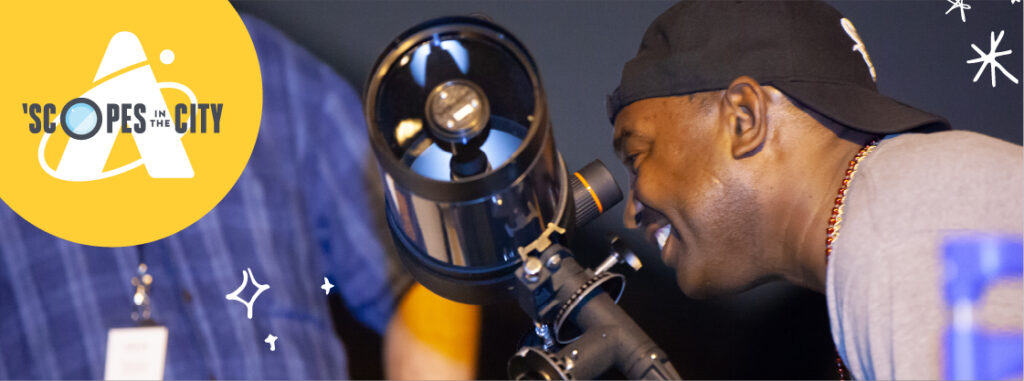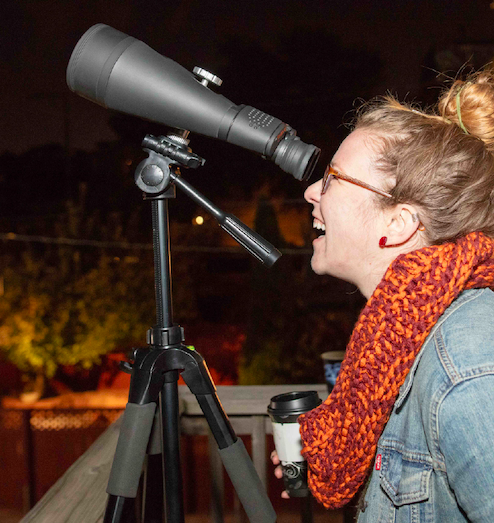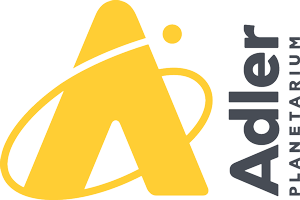’Scopes in the City

Look up at the Moon, Jupiter, Saturn, and even the Sun during free telescope observing events across Chicago.
Our ‘Scopes in the City astronomy educators and volunteers bring the museum—and the universe—a little closer to you! These free telescope observing programs at local libraries, restaurants, bars, and parks allow us bring our telescopes used for observing the night and daytime sky across many Chicago neighborhoods.
Upcoming 'Scopes In The City Events
All ’Scopes in the City events are free and weather permitting, so get updates about upcoming sky observing opportunities by subscribing to our Adler Events (Digital and In Person) or Night Sky Observing email lists or by joining our ‘Scopes with the Adler Facebook group.

Where We've Been | 2015–Now
It’s simple! We set up 1-2 telescopes, and anyone walking by is invited to look up with us and chat about what we’re seeing. Depending on how busy it is, we may also have a few quick hands-on activities to share with guests.
Every ‘Scopes in the City event is free—there is no cost to the host or participants.
Each ‘Scopes In The City event is different and reservation requirements are determined by the venue. Please contact the event venue for questions and additional information.
We are happy to take ’Scopes in the City anywhere in the Chicagoland area! We appear often at Chicago Public Library branches, parks, neighborhoods, and other places where people gather. While we are not limited to only locations in Chicago, we give priority to scheduling programs within Chicago.
The sky belongs to everyone, and we invite everyone to join us in looking up!
We usually set up our telescope(s) for 1-2 hours.
No! In May, June, and July, we often book times during the day to view the Sun, primarily because sunset is so late during these months.
No—we schedule ‘Scopes in the City throughout the year. In fact, some of the best sky viewing is during the winter. Bundle up if you join us for one of those dates!
It depends on what is in the sky throughout the year and the light pollution situation at the site. Generally, we try to schedule dates/times when the Moon or a bright planet (such as Venus, Mars, Jupiter, or Saturn) is visible, or we may schedule a daytime event to view the Sun safely.
Usually, a ’Scopes in the City appearance is completely at the mercy of the weather. If it is cloudy or too windy, we generally have to cancel the program. In limited cases, we may be able to reschedule. We can usually make the go/no-go call about 24 hours prior to the date/time of the program based on the weather forecasts. This gives us and our program partners time to get the word out about the cancellation. For a small number of programs, we may be able to take the appearance indoors with some hands-on activities, though this is not an option available in all cases.
We welcome suggestions for where ’Scopes in the City can appear. The program is not available for private (non-public) events. If you have a location suggestion, please fill out this form. We generally schedule 25-40 ’Scopes in the City programs throughout the year.
The program must be open to the general public—ideally in a high-traffic area—and the site must have a clear view to the southeast, south, and/or southwest sky. If there is a question about the sky viewing suitability of a particular site, we may request to make an advance visit to ascertain this before we schedule a program, or we may request pictures of the site from the host.
No, our telescopes include both unpowered and battery-powered models. We’re self-sufficient.
We welcome your questions! Please email us at scopesinthecity@adlerplanetarium.org.
Thanks To Our Sponsors
A special thank you to the Founding Donor of our public observing programs, The Petrovich Family




